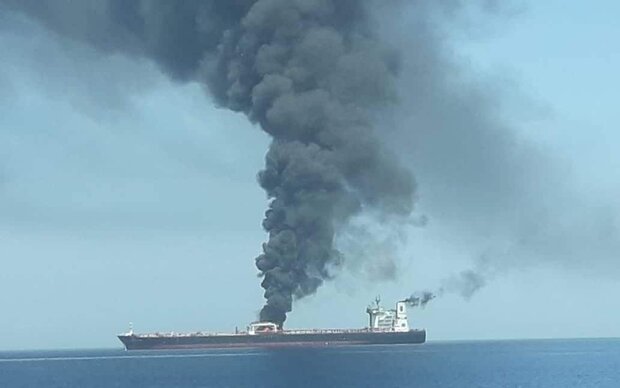TEHRAN, Jun. 16 (MNA) – Referring to US policy papers, Bangkok- based geopolitical expert says familiar pattern by the US to rush to conclusions before any investigation makes the US and its allies the prime suspects of attacks in Oman Sea, not Iran.
While the Japanese Prime Minister was visiting Iran after 4 decades and many expected even more reduction of the tensions in the region due his visit, in another suspicious and provocative move two large tankers were hit by explosions in the Sea of Oman on Thursday, a move that can intensify the tensions more than before.
Following the attack, US Secretary of State Mike Pompeo hastily accused Iran of carrying out the attacks without providing any evidence to back up his accusation.
In this regard, Iran rejected US Secretary of State Mike Pompeo's anti-Iran accusations, saying the suspicious nature of the recent attacks on two oil tankers in the Sea of Oman is "not funny or ridiculous but alarming".
To shed more light on the issue, an interview was done with Bangkok- based geopolitical researcher Anthony Cartalucci.
Following is the full text of the interview:
The US administration has hastily accused Iran of being behind the attacks on two oil tankers in Oman Sea. How do you assess validity of the accusations?
As the US has done before with now verified fabrications, it has hastily - and without any evidence or investigation - accused Iran of being behind these attacks. It did so within the same day of the attacks. So of course, there is no validity to the accusations. Even a local crime committed within the United States cannot be "solved" in a single day and without any sort of investigation, so how could an incident as serious as this be somehow solved without an investigation or evidence so quickly?
The US reveals its hand by quickly accusing Iran before any sort of independent investigation can be mounted. We've seen this pattern before in Iraq in 2003 where the rush to war was made before inspectors could confirm US claims of "weapons of mass destruction" in Iraq. We also saw the US did this last year in Syria where it quickly accused the Syrian government of a "sarin chemical attack" in Douma before carrying out military strikes - all done before the OPCW could even begin its investigation - which by the way, concluded claims of sarin gas were false.
This familiar pattern by the US to rush to conclusions before any investigation is mounted makes the US and its allies the prime suspects, not Iran.
Is it rational for Iran to commit such an action, while the Japanese PM is visiting Iran?
For Iran, it is not rational at all to carry out such an attack, and especially so against a ship belonging to Japan while the Japanese Prime Minister is in Iran. Iran's greatest strength at the moment is Washington's lack of credibility and increasingly blatant aggression against Iran. The international community can see that Iran upheld its part of the so-called "Iran Nuclear Deal" and that it was the US who walked away from it without justification. The best cards in Iran’s hand are the growing consensus that it is being victimized. Thus Tehran has nothing at all to gain by staging attacks against international shipping through the Strait of Hormuz.
Who in fact is the biggest beneficiary of the provocative incidents taking place in the region that threatens world energy security and route? Can any instability in the region affect EU interests?
The United States in its own policy papers - like Brookings Institution's 2009 "Which Path to Persia?" report - openly admit that the US would greatly benefit from a "provocation" that would allow them to increase military aggression against Iran.
Brookings policymakers would literally claim, "...it would be far more preferable if the United States could cite an Iranian provocation as justification for the airstrikes before launching them. Clearly, the more outrageous, the more deadly, and the more unprovoked the Iranian action, the better off the United States would be. Of course, it would be very difficult for the United States to goad Iran into such a provocation without the rest of the world recognizing this game, which would then undermine it."
The US is the obvious benefactor. Its partners in the region - believing in whatever promises were made to them by Washington about a "post-Iranian" Middle East - would also benefit by aiding this agenda.
Higher oil prices while sanctions squeeze Iran, Venezuela, and Russia can only benefit Western oil corporations. For the EU - interests are divided between multinational corporations there that seek to dominate the Middle East alongside Washington and Wall Street and those who seek to do business with Iran. Obviously pressure from Washington to accept its version of events would tilt the balance in favor of the former and place greater pressure on those seeking peace and cooperation - just as the staged attacks were designed to do. Higher oil prices as a result of instability and violence in the Middle East will further complicate European energy security which only further plays into Washington's hands which seeks to pry Europe away from Russian and Iranian hydrocarbons in favor of its "freedom gas" and sources from among its allies.
Interview by Payman Yazdani


No comments:
Post a Comment